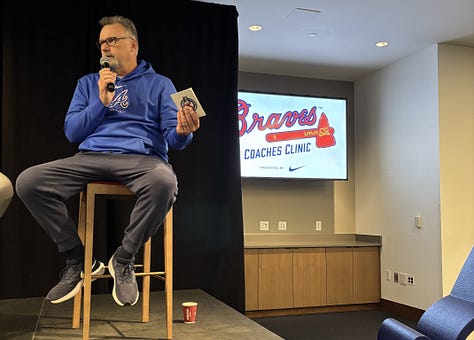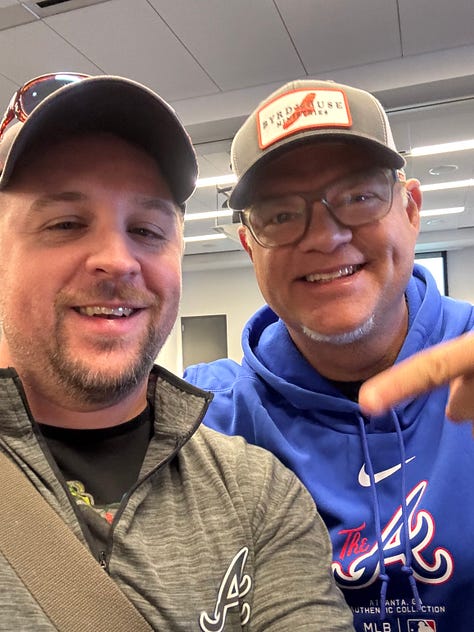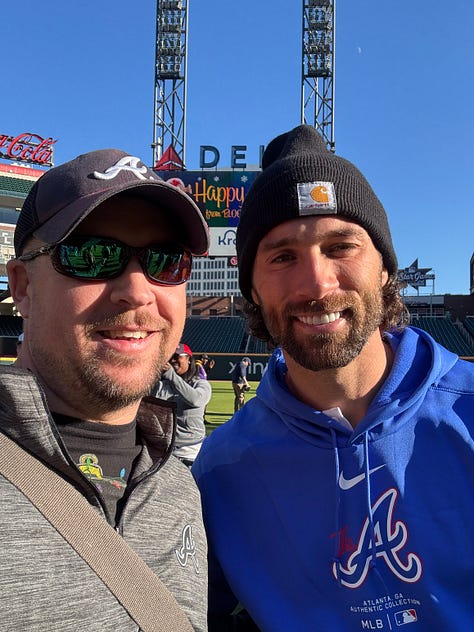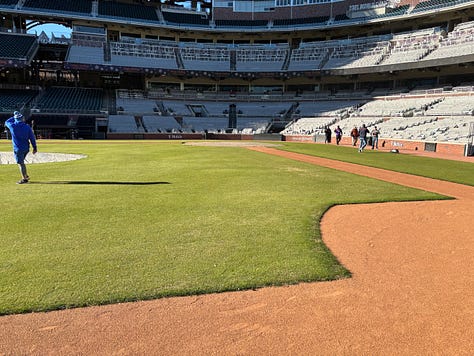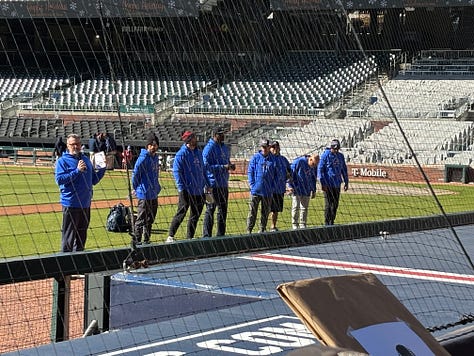Reviving Youth Baseball: Practical Life Lessons from the Atlanta Braves Coaches Clinic
These lessons apply far beyond the baseball field, providing guidance for how we approach our work, our teams, and our personal challenges.
For years now, recreational youth baseball leagues have been in decline. Major League Baseball organizations, including the Atlanta Braves, have recognized this trend and are actively working to reverse it. Unlike many clubs, the Braves aren’t just acknowledging the problem—they’re taking action.
This offseason, my local league (Simpsonville Rec) partnered with the Braves as part of their ongoing initiative to support and strengthen rec leagues throughout the South. While the full scope of this partnership is still unfolding, one immediate benefit came last weekend when I traveled to Atlanta with another coach to attend the Braves Coaches Clinic.
Inside the Coaches Clinic
This three-hour, face-to-face clinic brought together 300 coaches from across the Southeast. It featured six sessions, each led by Braves coaches or alumni, focusing on core facets of the game—Pitching, Catching, Hitting, Infield, Outfield, and a dedicated Q&A. For me, it was an incredible experience, blending practical tips with powerful lessons that transcend the diamond.
Embracing Failure and Seeking Greatness
If you’ve followed this blog for a while, you know I’m a big advocate for embracing failure as a means to grow. (I’ve written about it before: Embracing Failure: A Recipe for Growth.) The Braves’ philosophy aligns perfectly with this mindset. They encourage coaches, and by extension their players, to embrace the “freedom to fail.” In baseball, failure is inevitable—hitters often fail seven out of ten times. The key is to learn from each setback, to approach every play, pitch, and at-bat expecting greatness, but not fearing the mistakes that will happen along the way.
Greatness doesn’t find you by accident. You have to seek it out, desire it, and prepare for it. This means practicing not only the physical skills of the game but also the mental readiness required to seize those big moments. Are you doing drills that challenge players to be clutch under pressure? Are you training their mindset as much as their batting stance?
Communication and Team Dynamics
Another powerful takeaway from the clinic was the importance of communication on the field. Players should be talking to each other, supporting one another, and staying present in the moment. In an ideal scenario, coaches step back during the game, allowing the players’ voices to shine through. This on-field chatter fosters trust, unity, and awareness—a lesson that’s just as relevant in the workplace.
In your career, consider this: are managers doing all the talking, or are team members collaborating, problem-solving, and supporting each other directly? A good leader, like a good coach, sets the lineup, places employees where they can succeed, and then provides guidance as needed—rather than micromanaging or monopolizing communication.
Respecting the Game—and Your Work
The Braves also emphasize respect for the game. There’s no such thing as an “easy play.” Each situation demands a specific set of skills, and different players excel in different areas. The same holds true at work—every task involves its own challenges. Respect the uniqueness of each role, and acknowledge that what looks simple from the outside often requires significant skill.
Understanding the Speed of Play
In baseball, context matters: a faster runner forces a quicker catch-and-throw to first, while a power hitter influences defensive positioning. The higher the level of play, the faster the pace—and the more critical it becomes to understand that pace. This principle extends into our daily lives. Knowing the “speed of the game” in your projects or workplace tasks allows for better planning, time management, and adaptation when circumstances change.
Gratitude and Acknowledgments
I want to thank all the Braves coaches who participated in the clinic. It truly was a treat for someone who who has a passion for baseball, the Atlanta Braves, and mentoring kids. A special shout-out goes to Matt Tuiasosopo, the Braves Infield Coach, for sharing many of the practical insights shared here. These lessons apply far beyond the baseball field, providing guidance for how we approach our work, our teams, and our personal challenges.
Have a wonderful weekend, everyone, and remember: Embrace your failures, communicate openly, respect each other’s strengths, and understand the pace of the game—whether that game is baseball, business, or life.
If you are just here to see a few pictures of the event.
